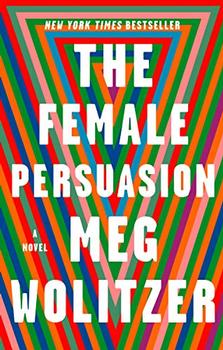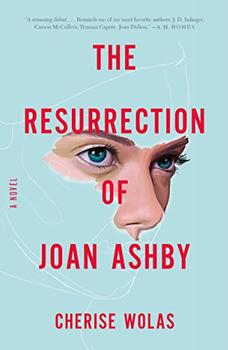Summary | Excerpt | Reading Guide | Reviews | Beyond the book | Read-Alikes | Genres & Themes | Author Bio

A Novel
by Meg WolitzerA college freshman struggling for identity. A 1960s feminist icon attempting to maintain her relevance. A son trying to heal his broken family. A daughter striving for acceptance. These are just a handful of the characters featured in Meg Wolitzer's novel, The Female Persuasion, each of whom are attempting to answer the question: "What is my role in the world?"
The story opens with college freshman, Greer Kadetsky. Having lost out on her chance at an Ivy League school, Greer is adrift at her safety school, struggling to form a sense of her own identity and purpose. After an encounter with world-famous '60s feminist icon, Faith Frank, Greer feels the world has opened its possibilities to her, and is encouraged to pursue a path helping impoverished and disadvantaged women around the world. This career arrives in the form of Faith's new business organization; a feminist nonprofit, backed by somewhat disreputable venture capitalist, Emmett Shrader. The novel follows Greer from her early 20s to mid-30s as she struggles to maintain her years-long relationships with her boyfriend, Cory and best friend, Zee all while balancing her ambition with her feminist morals.
In a novel focused around the ways women relate to each other, naturally the relationship between Greer and her mentor, Faith Frank, takes center stage. Both women crave acknowledgment and approval of their achievements and intelligence and find this through work. After the first meeting between the two women at Greer's college, Greer forms a highly idealized image of Faith and the change she's making in the world. Faith fills a void in Greer's life, and provides a level of encouragement and approbation that Greer has never received from her own parents. However, though Faith's presence in her life centers Greer in many ways, Faith's almost-complete control over Greer begins to cause her to sway from her values in order to win Faith's approval. In one scene, Greer, a committed vegetarian, eats a steak that Faith has cooked because, "somehow she felt sure that turning down Faith's meat would also be a disappointment to Faith." This is the first, but certainly not the last time, Greer is asked to compromise her values because of Faith's actions. The balance Greer struggles to maintain between trying to please her mentor and staying true to herself is a running theme throughout.
The Female Persuasion is a constant discussion of feminism and what constitutes a feminist in today's world. As more information is revealed about Faith Frank later in the novel, certain issues come to light regarding her role as a feminist and whether the title can still be applicable to her, even when she does not necessarily serve a group of women's immediate best interests. Similarly, Wolitzer subverts typical examples of feminism in Greer's boyfriend, Cory, who moves back home after a family tragedy to help take care of his mother. He ends up taking over her previous job as a house cleaner, and begins cooking the family meals, cleaning his own house, and becoming his mother's primary care-taker. Greer's mother says of Cory: "Here's this person who gave up his plans when his family fell apart...Maybe I'm totally wrong, Greer. But I feel like Cory is kind of a big feminist right?" Does being a feminist mean constantly battling the world for change or can it be something that is accomplished within your own home, changing the world a little at a time?
The discussion of feminism and its portrayal within The Female Persuasion is somewhat narrow. Because Greer Kadetsky and Faith Frank are both white, middle-class, straight women, they represent a very specific subset of feminism in the United States that leaves out a range of experiences. This is an understandable choice as Wolitzer herself embodies all these traits and was likely writing from her own experiences navigating the world. However, it does constrain the novel's more universal accessibility.
The Female Persuasion is an enjoyable and entertaining look into feminism in the United States today. The book's real strengths lie in the relationships Wolitzer builds between her characters. The politics are somewhat incidental; read this novel for the genuine, profound ways the characters find to relate to one another.
![]() This review was originally published in The BookBrowse Review in May 2018, and has been updated for the
July 2019 edition.
Click here to go to this issue.
This review was originally published in The BookBrowse Review in May 2018, and has been updated for the
July 2019 edition.
Click here to go to this issue.

If you liked The Female Persuasion, try these:

The Most Precious Substance on Earth
by Shashi Bhat
Published 2023
Journey Prize winner Shashi Bhat's sharp, darkly comic, and poignant story about a high school student's traumatic experience and how it irrevocably alters her life, for fans of 13 Ways of Looking at a Fat Girl, Girlhood, and Pen15.

The Resurrection of Joan Ashby
by Cherise Wolas
Published 2018
Epic, propulsive, incredibly ambitious, and dazzlingly written, The Resurrection of Joan Ashby is a story about sacrifice and motherhood, the burdens of expectation and genius. Cherise Wolas's gorgeous debut introduces an indelible heroine candid about her struggles and unapologetic in her ambition.
Your guide toexceptional books
BookBrowse seeks out and recommends the best in contemporary fiction and nonfiction—books that not only engage and entertain but also deepen our understanding of ourselves and the world around us.